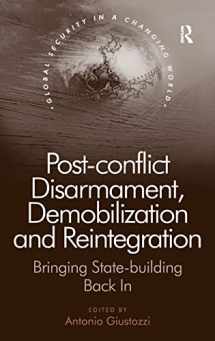
Post-conflict Disarmament, Demobilization and Reintegration: Bringing State-building Back In (Global Security in a Changing World)
ISBN-13:
9781409437383
ISBN-10:
1409437388
Edition:
1
Author:
Antonio Giustozzi
Publication date:
2012
Publisher:
Routledge
Format:
Hardcover
160 pages
FREE US shipping
Book details
ISBN-13:
9781409437383
ISBN-10:
1409437388
Edition:
1
Author:
Antonio Giustozzi
Publication date:
2012
Publisher:
Routledge
Format:
Hardcover
160 pages
Summary
Post-conflict Disarmament, Demobilization and Reintegration: Bringing State-building Back In (Global Security in a Changing World) (ISBN-13: 9781409437383 and ISBN-10: 1409437388), written by authors
Antonio Giustozzi, was published by Routledge in 2012.
With an overall rating of 3.9 stars, it's a notable title among other
books. You can easily purchase or rent Post-conflict Disarmament, Demobilization and Reintegration: Bringing State-building Back In (Global Security in a Changing World) (Hardcover) from BooksRun,
along with many other new and used
books
and textbooks.
And, if you're looking to sell your copy, our current buyback offer is $0.3.
Description
This book revisits post-Cold War Disarmament Disintegration and Reintegration (DDR) programmes in the light of previous experiences of disarmament, demobilisation and reintegration. In the history of North America and Europe, in particular, such programmes had a major impact on state-building, contributing to the development of the welfare state, shaping political settlements and directing government policy to maintain social peace. The authors in this important book ask what is left of these state-building dimensions in contemporary DDR programmes and whether the constraints imposed by international organisations on DDR programmes have more negative effects than positive ones. The role of political leadership in DDR processes is highlighted: can bureaucratically-driven processes deliver success? Only if political elites take full control and manage DDR programmes can there be a lasting impact on state-building. Even then, most political elites avoid deep changes in their relationship with the veterans. Is there a chance of reshaping international intervention in such a way as to favour the development of a 'social contract' between political elites and veterans? In taking a historical perspective, this book is unique in the existing literature on DDR and will be essential reading for policy makers, students and scholars of conflict studies, and those working in NGOs, particularly donor agencies. This volume was produced with the contribution of the Crisis States Research Centre (LSE).


We would LOVE it if you could help us and other readers by reviewing the book
Book review

Congratulations! We have received your book review.
{user}
{createdAt}
by {truncated_author}


